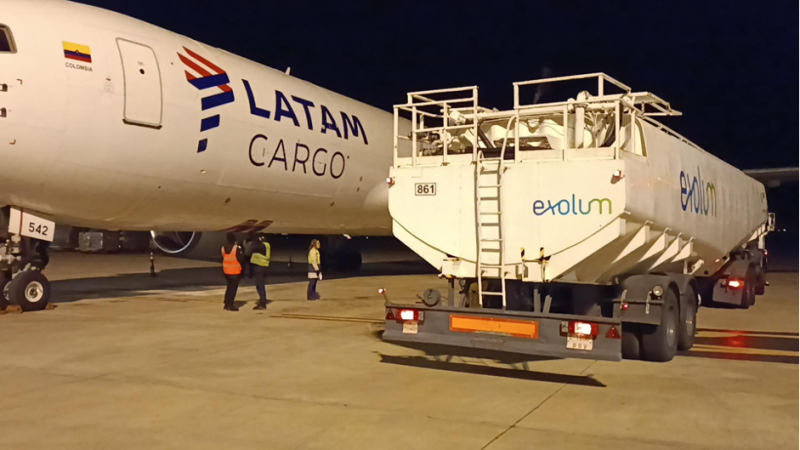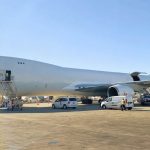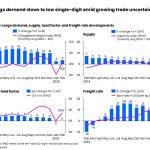LATAM Cargo, Kuehne+Nagel and Elite Flower invest in sustainable aviation fuel (SAF)
As part of Mother’s Day celebrations, LATAM Cargo, Kuehne+Nagel and Elite Flower joined forces to purchase more than 25,000 liters of sustainable aviation fuel (SAF). The amount purchased would reduce the equivalent of the total emissions generated by a cargo flight on the Bogota-Miami route, carrying a large shipment of flowers, mainly roses.
The SAF acquired is a type of fuel that comes from alternative raw materials such as waste, fats and oils, among others, to produce a low-CO2 fuel. The SAFis then blended with conventional fuel.
In this case, the sustainable aviation fuel purchased was produced from used cooking oil, which after being treated is blended with traditional jet fuel. Considering that SAF has an attributed CO2 reduction factor of about 80% in its life cycle compared to the conventional fuel, the companies purchased the necessary quantity of SAF to achieve the total emissions reduction on the announced route.
“This initiative marks yet another milestone for the LATAM Group in our efforts against climate change. We want to make a significant contribution to the sustainable development of the region, and to this end, among other things, we have committed to be carbon neutral by 2050. This purchase is in line with this objective as it allows us to continue moving forward with our SAF agenda. It also reflects the importance of collaboration throughout the logistics chain in order to achieve major changes. We hope that examples like this help capitalize on South America’s potential for SAF generation,” says Andrés Bianchi, CEO of LATAM Cargo.
In the case of the global logistics company, Kuehne+Nagel, this represented a milestone in its goal to develop tangible solutions for all types of customers and industries, with the aim of reducing CO2 emissions in supply chains and their environmental impact. In this line, Ingo Goldhammer, President of Kuehne+Nagel for South and Central America, said: “There is no doubt that climate change is one of the greatest challenges we face. At Kuehne+Nagel we understand this and, as an industry, we need to accelerate the path to reducing global warming. Our alliance with Elite Flower and LATAM Cargo, reflects that collaboration between companies is the best way to carry out concrete actions, with each company contributing its experience and expertise to work under a common goal that benefits us all”.
Galo Sanchez, Executive Vice President, Elite Group, a recognized company in the floral world, added: “Sustainability is at the core of our values at Elite Group and in each part of our business units. Thus, we understand the urgency of addressing the environmental challenges of flower’s transportation by air freight from Colombia and Ecuador to the United States, Canada and parts of Europe. Our relentless pursuit to reduce emissions continues as we work toward our net zero goal. By investing directly in SAF, we are taking a significant step toward reducing our emissions and contributing to a better future for the environment. This initiative is in line with our broader sustainability strategy, where we are exploring innovative solutions to achieve a more sustainable supply chain.”
According to IATA, the use of SAF can currently make a big difference in the decarbonization of the aviation industry. However, the amount of SAF available worldwide is limited, mainly due to the lack of conditions necessary for its research, development and production.
South America has great potential to produce SAF in terms of natural resources and expertise. Thus, it is capable of making a very significant contribution to climate action. For this reason, collaborative work between the different actors involved in the industry is necessary to promote the production of SAF in the region.
Commitment to sustainability
In 2021, the LATAM Group launched its renewed sustainability strategy in which it set challenging goals: for SAF to represent 5% of all fuel consumption in its operations by 2030; to achieve carbon neutrality by 2050; to eliminate single-use plastics by 2023; and to become a zero-waste-to-landfill group by 2027.
For its part, Kuehne+Nagel communicated in March its new business strategy for the next four years and, in order to meet its goal, it established the following priority pillars: Kuehne+Nagel Experience, Digital Ecosystem, Market Potential and Living ESG. The latter with a focus on developing concrete actions that contribute to reducing environmental impact, along with working at a social level with the communities with the support of a consolidated governance structure. In its commitment to decarbonize the industry, the company has reached important agreements at a global level to be able to offer SAF in the 100 countries where it operates.
In addition to this, Kuehne+Nagel provides platforms to its clients such as myKN and SeaExplorer, capable of providing visibility on the carbon emissions of operations as well as providing reporting that seeks to measure, avoid and reduce the carbon footprint around logistics processes














